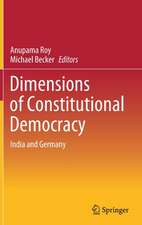Classes and Elites in Democracy and Democratization: A Collection of Readings: Sociology/Psychology/Reference
Editat de Eva Etzioni Halevyen Limba Engleză Hardback – iul 1997
| Toate formatele și edițiile | Preț | Express |
|---|---|---|
| Paperback (1) | 497.45 lei 6-8 săpt. | |
| Taylor & Francis – aug 1997 | 497.45 lei 6-8 săpt. | |
| Hardback (1) | 1222.85 lei 6-8 săpt. | |
| Taylor & Francis – iul 1997 | 1222.85 lei 6-8 săpt. |
Preț: 1222.85 lei
Preț vechi: 1491.28 lei
-18% Nou
Puncte Express: 1834
Preț estimativ în valută:
233.99€ • 244.30$ • 193.66£
233.99€ • 244.30$ • 193.66£
Carte tipărită la comandă
Livrare economică 05-19 aprilie
Preluare comenzi: 021 569.72.76
Specificații
ISBN-13: 9780815322047
ISBN-10: 0815322046
Pagini: 376
Dimensiuni: 138 x 216 x 26 mm
Greutate: 0.59 kg
Ediția:1
Editura: Taylor & Francis
Colecția Routledge
Seria Sociology/Psychology/Reference
Locul publicării:Oxford, United Kingdom
ISBN-10: 0815322046
Pagini: 376
Dimensiuni: 138 x 216 x 26 mm
Greutate: 0.59 kg
Ediția:1
Editura: Taylor & Francis
Colecția Routledge
Seria Sociology/Psychology/Reference
Locul publicării:Oxford, United Kingdom
Cuprins
Foreword -- Preface -- Introduction -- PART I: Classes in Democracy and Democratization—Classical Analyses -- Ruling Class, Proletariat, and Bourgeois Democracy/Selections from the Works of Karl Marx and Friedrich Engels -- Intellectuals and the Hegemony of the Dominant Class in Modern Western Democracies/Selections from the Work of Antonio Gramsci -- Repressive Tolerance in Contemporary Democracy/Selections from the Work of Herbert Marcuse -- The Reproduction of Working-Class Exploitation in Capitalist Democracies/Selections from the Work of Louis Aithusser -- The Democratic Route to Modern Society/Selections from the Work of Barrington Moore -- Some Social Requisites of Democracy/Seymour Martin Upset -- PART II: Elites in Democracy and Democratization—Classical Analyses -- The Governing Elite in Present-Day Democracy/Selections from the Work 0f Vilfredo Pareto -- The Ruling Class in Representative Democracy/Selections from the Work of Gactano Mosca -- Democracy and the Countervailing Powers of Bureaucracy, Charisma, and Parliament/Selections from the Work of Max Weber -- The Power Elite/C. Wright Mills -- An Elite Theory of Democracy/Selections from the Work of Joseph A. Schumpeter -- The Ruling Minorities in Western Societies/Selections from the Work of Raymond Aron -- PART Ill: CTasses in Democracy and Democratization—New Analyses -- The Relative Autonomy of the Capitalist State, Democracy, and Dominant Class Hegemony/Selections from the Work of Nicos Poulantzas -- Democratic Sovereignty, the Bourgeoisie’s Dominance, and Disciplinary Power in the West/Selections from the Work of Michel Foucault -- Democracy and Capitalism [Contradiction, Accommodation, and Instability]/Selections from the Work of Samuel Bowles and Herbert Ginus -- Rediscovering the American Democratic Dream/John F. Manley -- Transition to Capitalist Democracy as Class Compromise/Selections from the Work of Adam Przeworski -- The Rule of Capital and the Rise of Democracy/Goran Therborn -- Economic Development and Democracy [The Role of Subordinate Classes]/Selections from the Work of Evelyne Huber, Dierrich Rueschemeyer, and John D. Stephens -- PART IV: Elites In Democracy and Democratization—New Analyses -- The Irony of Democracy/Thomas Dye and Harmon Zeigler -- Prospects for Pluralism [Linkages Between Leaders and Followers in the American Democracy]/Selections from the Work of Nelson W. Polsby -- Democratic Government by Leading Minorities, Responsiveness, and Responsibility/Selections from the Work of Giovanni Sartori -- National Elite Configurations and Transition to Democracy/Selections from the Work of G. Lowell Field, John Higley and Michael G. Burton -- Modes of Transition and the Emergence of Democracy In Latin America and Southern Europe/Selections from the Work of -- Terry Lynn Karl and Philippe C. Schmirter -- South Korea’s Elite Settlement and Democratic Consolidation -- Michael G. Burton and Jai P. Ryu -- Party Elites and Democratic Consolidation in Southern Europe/Leonardo Morlino -- Delegative Democracy/Guillermo O’Donnell -- Elites’ Political Values and Democratic Consolidation In Brazil/Elisa P. Reis and Zairo B. Clieibub -- The Role of Political Elites in the Transition from Communism to Democracy -- The Case of Poland/Wlodzimierz Wcsolowski -- PART V: Classes and Elites in Democracy and Democratization -- The Oligarchical Tendencies of Working-Class Organizations/Selections from the Work of Robert Michels -- State Leaders as Promoters of Capitalist Interests in Democracies/Selections from the Work of Ralph Miliband -- The Ruling Class Does Not Rule -- [State Managers, Capitalists, and the Working Class ia Capitalist Democracies]/Selections from the Work of Fred Block -- The Dilemma of Pluralist Democracy [Autonomy Versus Equality]/Selections from the Work of Robert A. Dahi -- The Top-down and Bottom-up Construction of Democracy/Selections from the Work of Charles Tilly -- The Third Wave -- [Economic Development, Expansion of the Middle Class,Elite Compromises, and Democratization in the -- Late Twentieth Century]/Selections from the Work of Samuel P. Huntington -- Class Inequalities, Elite Patterns, and Transition to Democracy in Latin America/Selections from the Work of larry Diamond and Juan Linz -- Capitalism by Democratic Design in East/Central Europe/Selections from the Work of Claus Offe -- Elites and the Working Class -- On Coupling Uncoupling Democracy, and (In) equalities in the West/Eva Etzioni-Halevy -- Conclusion -- Indexes.
Descriere
First Published in 1997. This collection of readings has been complied on the assumption that for an adequate explanation of the success and failure, the strengths and weaknesses, of democracy, it is necessary to resort to both class and elite theories and to strive for the future development of the extant beginnings of a synthesis between them.



























